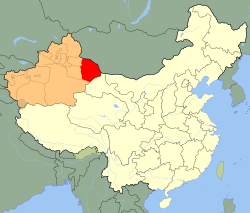Kumul Khanate
| Kumul Khanate | ||||||||||
| Vassal of the Qing dynasty (1696-1912) Vassal of the Republic of China (1912-1930) |
||||||||||
|
||||||||||
|
Location of the Kumul Khanate
|
||||||||||
| Capital | Kumul, Xinjiang | |||||||||
| Languages | Chinese language, Uyghur language (Turki) | |||||||||
| Religion | Sunni Islam | |||||||||
| Government | Monarchy | |||||||||
| Khan | Muhammad Shah | |||||||||
| • | 1908-1930 | Maqsud Shah (last) | ||||||||
| Chancellor/Vizier | Unknown | |||||||||
| • | 1930 | Yulbars Khan (last) | ||||||||
| History | ||||||||||
| • | Established | 1696 | ||||||||
| • | Disestablished | 1930 | ||||||||
| Currency | Xinjiang coins | |||||||||
|
||||||||||
The Kumul Khanate was a semi-autonomous feudal Turkic khanate within the Qing dynasty and then the Republic of China until it was abolished by Xinjiang governor Jin Shuren in 1930.
The khans of Kumul were direct descendants of the khans of the Chagatai Khanate. It came under Qing rule in 1696 and remained a khanate as a part of the Qing Empire.
The Ming dynasty established a tributary relationship with the Kumul Khanate, which was heavily involved in the Ming–Turpan conflict. The Khanate paid tribute to the Ming. The Kumul Khanate under Sa'id Baba supported Chinese Muslim Ming loyalists during the 1646 Milayin rebellion against the Qing dynasty. After the defeat of the Ming loyalists, during which the Kumul Prince Turumtay was killed at the hands of Qing forces, Kumul submitted to the Qing.
Beginning in 1647, the rulers of Hami submitted to the Qing dynasty and sent tribute. The title "Jasak Darhan" was granted to Abdullah Beg, ruler of Hami in 1696 after submitting to the Qing as a vassal during the Dzungar–Qing War.
The khanate had fought against the Dzungars for the Qing. Kumul continued as a vassal khanate when Xinjiang was changed into a province in 1884 after the Dungan revolt.
The khans also were given the title of Qinwang (Prince of the First Rank Chinese: 親王; pinyin: qīn wáng), by the Qing Empire. The khans were allowed enormous power by the Qing court, with the exception of administering execution, which had to be allowed by a Chinese official posted in Kumul. The khans were officially vassals to the Emperor of China, and every six years were required to visit Beijing to be a servant to the Emperor during a period of 40 days.
...
Wikipedia

